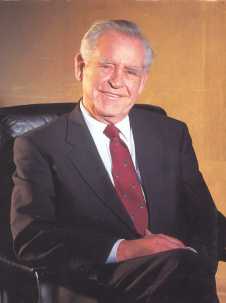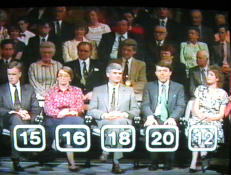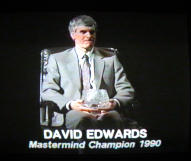Mastermind
Contents |
Host
Peter Snow (radio version)
Clive Anderson (Discovery series)
Co-hosts
Scorer and Timekeeper: Mary Craig (often referred to as the "Dark Lady" who sat by Magnus' side but never spoke).
Broadcast
BBC 1, 11 September 1972 - 1 September 1997
BBC Radio 4, 1998-2000
Discovery Mastermind BBC Manchester for Discovery Channel, 14 November 2001 - 16 January 2002
BBC 2, 30 December 2002 (one-off celebrity special featuring Adam Hart-Davis, Janet Street-Porter, Vic Reeves and Jonathan Meades)
BBC 1 (Junior and Celebrity versions) and BBC 2, 7 July 2003 to present
Synopsis
Considered by many to be "the ultimate test of memory and knowledge", Mastermind is a simple quiz. However, at times it can prove quite fascinating.
Originally set in the chapel of a college or hall, nowadays a studio in sunny Manchester, John (originally Magnus) puts four contestants through their paces. Each contestant has previously submitted a specialist subject, which can be anything you like as long as the subject is deep enough. These are judiciously researched beforehand.
The seating arrangements
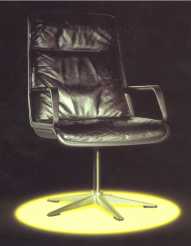 The black chair that has become the programme's trademark.
The black chair that has become the programme's trademark.In Round One, each contestant goes up to the famous black chair (pictured) one by one, and is asked "Name?", "Occupation?" and "Specialised subject?" The contestant is then subjected to two minutes of quick-fire questions about their subject. (Contestants can pass if they wish, although in the event of a tie these are taken into account.) At the end of the two minutes, a buzzer is sounded and, if John is in the middle of a question, he uses one of television's most famous catchphrases, originally used by Magnus: "I've started so I'll finish". (Though unlike Magnus, he does not follow this up with "And you may answer".)
And now, general knowledge
After each of the four contestants have had their go, the scores are read out in reverse order. Round Two is played similarly to Round One, but this time the subject is always general knowledge, and contestants play in the order of position, the person with the least points going first.
After that, the scores are read out again and the winner declared. (If there is a tie on points, the player with the "fewer or fewest" passes is declared the winner; if there is still a tie after passes are taken into consideration - a very rare occurence - then there is a "sudden death" tiebreaker in which both players separately face the same five questions and whoever gets the most right, wins.) The winner goes through to the semi-finals, the four (later six) winners of them going through to the final for the chance to win the engraved punchbowl which signifies the title of Mastermind champion.
And that's it. Bells? Whistles? Not one (with the possible exception of the intriguing black chair). And it doesn't need it for Mastermind, despite being simple, has become something of a national institution.
The end... not quite
The very last programme (at least, that's what it seemed at the time) was in 1997, where the programme went for the ego-trip of a lifetime to the remote Scottish island of Orkney to film in St. Magnus (geddit?), an 860 year old cathedral. Anne Ashurst, a novelist for Mills and Boon, was crowned the 'last ever' champion.
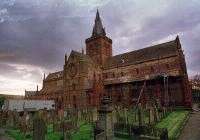 St. Magnus Cathedral
St. Magnus CathedralWhilst Magnus Magnusson now owns the original black chair, Peter Snow hosted a version on BBC Radio 4 (although the impact of the chair was a bit less...) and what felt like a slightly dumbed-down version ran for a year on the Discovery Channel, with a redeeming feature being a separate final for interactive play-along viewers.
And that really did seem to be it until a celebrity special aired in 2002...followed by the show itself returning the next year! Everything's remained pretty much the same, including the theme tune and chair (a replica of the original) though there is a bit more interaction between new host John Humphrys and contestant. Some believe the show has been 'dumbed down' seeing as more people are choosing subjects such as Doctor Who rather than The Crimean War, but it's good to see the show back again on the BBC. There's even been a kids series!
Key moments
The final of each series attracts a lot of attention, the most famous winner being Fred Housego, a London taxicab driver.
Catchphrases
"I've started so I'll finish."
"And at the end of a close competition, let's glance at the scores."
"So on now to the second round, the general knowledge round - and remember, if there is a tie at the end of this round, then the number of passes will be taken into consideration, and the contender with the fewer or fewest passes will be declared the winner. And if there is still a tie on passes, then there will be a sudden death play-off" (or "shoot-out", as John Humphrys usually puts it).
(Magnusson-era): "...and you may answer". Also: "Our thanks and commiserations to our three gallant runners-up!"
Magnus Magnusson normally signed off with, "All that it remains for me to do now is to thank the authorities here at (wherever) for all their great kindness and hospitality to us. Next week, we shall be at (wherever else). Until then, from 'Mastermind' in (wherever), it's goodbye!" John Humphrys signs off more simply, but equally effectively, with, "Do join us next time for more 'Mastermind'. Thank you for watching - goodbye!"
Inventor
The idea for the show comes from the experiences of the producer (Bill Wright) when he was a Prisoner of War during WWII. He was often asked for his "Name", "Rank" and "Number" (the only information he was obliged to give under the Geneva Convention). He decided to change this to "Name", "Occupation" and "Specialised Subject". Note the dark mise-en-scene, which is meant to give a sort of individualised, cross-examination feel. In the early days, this theme was even carried through to the on-screen credit for Magnus Magnusson, who was described not as "questionmaster" or something fluffy like that, but as "Interrogator".
Theme music
The theme tune is called Approaching Menace by Neil Richardson (who, incidentally, co-composed and conducted the score for the film Four Weddings and a Funeral).
A music clip is available from the TV Cream site.
Scoring records
Low scores:
- The famous Arfor Wyn Hughes is not, and never was, Mastermind's lowest scorer. The lowest score record for the regular (non-celebrity) series is 7 points, set by Colin Kidd in the 2005 series. He scored 4 on the history of the World Chess Championships and 3 on general knowledge.
- A year earlier, Gill Perry scored 8 points, 4 on her specialist subject (Babylon 5, series 1 & 2) and 4 on general knowledge.
- Previously, scores of 9 points were 'achieved' by Armando Margiotta, Sally Copeland and a community worker from Warwickshire who wishes to remain anonymous. Michael Kane also scored 9 in the 2004 final.
- The lowest-ever score on the programme was achieved by both Arabella Weir and Tara Palmer-Tompkinson in a 2004 celebrity special: 6 points. Only the previous week, Murray Walker had scored 7 points
High scores:
- The highest score was 41, set by Kevin Ashman in 1995. Jennifer Keaveney, Mary Elizabeth Raw and Anne Ashurst all scored 40.
Other:
- In a 2005 celebrity special, former Popstars winner Myleene Klass may have set a record for the most asynchronous performance - scoring 17 points from 18 questions about Sex & The City series 3, but only answering one question right in the general knowledge round.
Trivia
Over 57,000 questions were asked over the course of the original series.
In 1979 Magnus hosted a special Mastermind International programme involving quiz show winners from around the world (including UK Mastermind champions David Hunt and Rosemary James), which was won by the Irish contender John Mulcahy. Following this, International Mastermind (hosted by Huw Evans) ran for five series from 1979-83.
The last ever question asked on the Magnus version of the programme was virtually the same as the first one asked back in 1972 (concerning Picasso's Guernica). This was plotted beforehand as an in-joke to be played only if the scores did not depend on it.
One quirk of the show is that participants are always referred to as "contenders", never "contestants".
The rules were changed in 1995 to allow previous contenders (except finalists) to return. Uniquely, Isabelle Heward has been a contender four times (1983, 1996, 2003, 2005) and reached the semi-finals on each of her last three entries. All of her specialist subjects have been related to the cinema.
There was no regular series in 1982; instead previous winners were invited back for a Mastermind Champions contest, which was won by David Hunt.
There was a one-off Eurovision-themed edition in 1994, and a Doctor Who special in 2005.
1990 champion David Edwards subsequently scooped the top prize on Who Wants to be a Millionaire?, while Millionaire winner Pat Gibson completed "the double" the other way around in 2005. There was also a victory for 1995 champion Kevin Ashman at Torquay in the live, touring stage version of WWTBAM.
Magnus Magnusson on one of Esther Rantzen's chat shows revealed that Mastermind's success was due in part to TV campaigner Mary Whitehouse. Mastermind was originally intentioned as a quiz for "insomniac academics". In 1973 the BBC were showing a sitcom called Casanova '73, written by Galton & Simpson and starring Leslie Phillips in full-on "hellllo laydees" mode. It wasn't exactly The Borgias, but nevertheless Whitehouse cast a glance at the BBC and they moved it to late night, leaving a gap for Mastermind to fill in the interim. And the rest, as they say, is history. So there we are.
Champions
Regular series
| 1972 | Nancy Wilkinson |
| 1973 | Patricia Owen |
| 1974 | Elizabeth Horrocks |
| 1975 | John Hart |
| 1976 | Roger Prichard |
| 1977 | Sir David Hunt |
| 1978 | Rosemary James |
| 1979 | Philip Jenkins |
| 1980 | Fred Housego |
| 1981 | Leslie Grout |
| 1983 | Christopher Hughes |
| 1984 | Margaret Harris |
| 1985 | Ian Meadows |
| 1986 | Jennifer Keaveney |
| 1987 | Jeremy Bradbrooke |
| 1988 | David Beamish |
| 1989 | Mary Elizabeth Raw |
| 1990 | David Edwards |
| 1991 | Stephen Allen |
| 1992 | Steve Williams |
| 1993 | Gavin Fuller |
| 1994 | Dr George Davidson |
| 1995 | Kevin Ashman |
| 1996 | Richard Sturch |
| 1997 | Anne Ashurst |
Radio 4 version
| 1998 | Robert Gibson |
| 1999 | Christopher Carter |
| 2000 | Stephen Follows |
Discovery Mastermind
| 2001 | Michael Penrice |
BBC Revival
| 2003 | Andy Page |
| 2004 | Shaun Wallace* |
| 2005 | Patrick Gibson |
* The first black person to win the competition, and only the second ever person from an ethnic minority to reach the final.
Junior Mastermind
| 2004 | Daniel Parker |
| 2005 | Robin Geddes |
| 2006 | Domhnall Ryan |
Celebrity Mastermind
The following have won their respective show, which is not in a tournament format:
Jonathan Meades
Shaun Williamson
Bill Oddie
Stephen Fry
Edwina Currie
Matt Allwright
Steve Rider
Hugh Quarshie
Tom Ward
Jeremy Beadle
Monty Don
Graham Le Saux
Paul Ross
Iain Banks
Merchandise
I've Started So I'll Finish - The Story of Mastermind by Magnus Magnusson (ISBN: 0-316-64132-4) is an exhaustive account of the programme, by the person that knows it best.
See also
Web links
BBC: Junior Mastermind 2005 press release and 5min showreel
BBC: Junior Mastermind 2004 showreel (Real Media)

